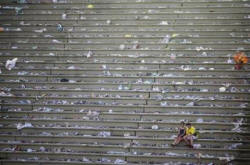 |
|

 Trash
and stink rise after Rio Carnival due to garbage strike
Trash
and stink rise after Rio Carnival due to garbage strike
[March 10, 2014] By Rodrigo Viga Gaier
RIO DE JANEIRO (Reuters) — If the hangovers many are nursing after their annual Carnival celebrations weren't enough, residents of Rio de Janeiro awoke Wednesday to smelly streets, mounting household garbage and heaps of party refuse uncollected for a fifth consecutive day.
|
The result of a trash collectors' strike timed to coincide
with the festival, which officially ended Wednesday, the growing
garbage backlog is a fetid after note to revelry that this year
drew as many as 5 million people to the streets of Brazil's
second-biggest city. By disrupting the city's ability to handle basic hygiene during
a routine, if big, event, the strike poses yet another possible
problem for Brazil just three months before Rio and 11 other
cities host the soccer World Cup. The event is expected to attract 600,000 foreign visitors, not
to mention the millions of Brazilians who will be watching the
events live, in host cities and bars and living rooms
nationwide. Already grappling with construction delays, security questions
and logistical problems before the World Cup, and Rio's hosting
of the Olympics just two years later, local authorities are
struggling to explain why they have been unable to clean up
after more than 400 street parades and block parties since
Friday. "We are working to normalize operations," Vinicius Roriz, the
president of Rio's municipal trash company, told reporters on
Wednesday, noting ongoing negotiations over salary demands made
by strikers. Many of the collectors are still on walkout, and some of the
more restive workers having already been fired. The company said
it was unable to say how soon the rubbish might be cleared. Even
after any agreement is made, Roriz said, it would still take
three days to clean up. The strike has turned many of Rio's most popular and exclusive
neighborhoods into garbage dumps. In Flamengo, a seaside neighborhood home to some of the biggest
Carnival celebrations, a major road known as the "aterro," or
landfill because it was built on reclaimed wetland, came to
embody the original sense of the word in recent days. Plastic,
paper and metal have been piled in its multiple traffic lanes. Beaches in Copacabana, Ipanema and Leblon, upscale districts
further south, are also strewn with litter, while residential
streets and popular tourist thoroughfares are overflowing with
stuffed trash cans and stinking heaps of refuse that doormen no
longer have room for inside their buildings. "It's chaos," said one doorman early Wednesday. "We have nowhere
left to put all this garbage." (Writing by Paulo Prada; editing by Cynthia Osterman) [© 2014 Thomson Reuters. All rights reserved.] Copyright 2014 Reuters. All rights reserved. This material may not be published,
broadcast, rewritten or redistributed.
|
 |

